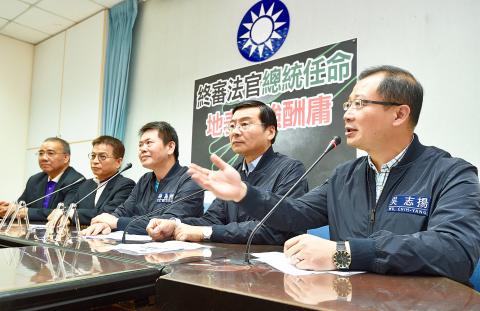Judicial Yuan officials yesterday defended a proposal to streamline the upper echelon of the judiciary, by drastically reducing the number of Supreme Court judges, while giving the president the power to appoint judges without legislative approval.
The proposed regulations would create a more equitable judicial system and help avert political interference, the officials said.
The proposal to reduce the number of judges at the highest level was presented at Monday’s meeting of a preparatory committee for the National Congress on Judicial Reform, with committee members saying that the president should have the power to appoint judges to the Supreme Court and the Supreme Administrative Court.

Photo: Peter Lo, Taipei Times
The main focus of the plan is to make the system more of a pyramid structure, cutting the numbers of Supreme Court and Supreme Administrative Court judges from a combined total of 94 to 14 and seven respectively within five years.
Under the proposal, the Judicial Yuan president would nominate 63 candidates — three times the required number of judges — before a screening committee trimmed the list to 42. The president would select candidates from the shortlist.
Judicial Yuan Secretary-General Lu Tai-lang (呂太郎) told a news conference in Taipei yesterday that although there is a perceived shift toward a situation where political appointments of Supreme Court judges could be made — a cause for concern among some people — the proposal would actually safeguard the system from political interference.
Taiwan has a similar justice system to Austria, Germany, Spain and South Korea, whose leaders appoint Supreme Court judges, with or without the approval of parliament.
“We are conforming to a worldwide trend,” Lu said.
At present, the Judicial Yuan nominates and appoints top-level judges, which has led to criticism and calls for change.
Some legal experts and judicial reform advocates say that the Judicial Yuan is not aligned with societal progress and the democratization of the past two decades, having a mindset and attitude still heavily influenced by the training they received during the Chinese Nationalist Party’s (KMT) one-party authoritarian rule.
The proposal has caused heated debate among lawmakers.
KMT caucus convener Sufin Siluko (廖國棟) said that President Tsai Ing-wei (蔡英文) is using illegal means to expand her powers, with the aim of influencing the judicial system.
“Tsai’s regime is heading toward a dictatorship. Her gradual moves to broaden her powers are the same as those conducted by Adolf Hitler,” Sufin said.
Democratic Progressive Party (DPP) Legislator Tsai Yi-yu (蔡易餘) defended the plan.
As the president would only choose from a shortlist of nominees, there would be relatively little outside influence in the process, Tsai Yi-yu said.
Grand Justice Lin Tzu-yi (林子儀), who convened Monday’s judicial reform meeting, said it is a misunderstanding to describe the proposed nomination procedure as allowing “political appointments.”
“The screening committee would be composed of legal experts, legislators and professionals from various sectors, so it would be a democratic process that ensures the courts represent the diverse voices of society,” Lin said.

The brilliant blue waters, thick foliage and bucolic atmosphere on this seemingly idyllic archipelago deep in the Pacific Ocean belie the key role it now plays in a titanic geopolitical struggle. Palau is again on the front line as China, and the US and its allies prepare their forces in an intensifying contest for control over the Asia-Pacific region. The democratic nation of just 17,000 people hosts US-controlled airstrips and soon-to-be-completed radar installations that the US military describes as “critical” to monitoring vast swathes of water and airspace. It is also a key piece of the second island chain, a string of

A magnitude 5.9 earthquake that struck about 33km off the coast of Hualien City was the "main shock" in a series of quakes in the area, with aftershocks expected over the next three days, the Central Weather Administration (CWA) said yesterday. Prior to the magnitude 5.9 quake shaking most of Taiwan at 6:53pm yesterday, six other earthquakes stronger than a magnitude of 4, starting with a magnitude 5.5 quake at 6:09pm, occurred in the area. CWA Seismological Center Director Wu Chien-fu (吳健富) confirmed that the quakes were all part of the same series and that the magnitude 5.5 temblor was

Taiwan will now have four additional national holidays after the Legislative Yuan passed an amendment today, which also made Labor Day a national holiday for all sectors. The Chinese Nationalist Party (KMT) and Taiwan People’s Party (TPP) used their majority in the Legislative Yuan to pass the amendment to the Act on Implementing Memorial Days and State Holidays (紀念日及節日實施辦法), which the parties jointly proposed, in its third and final reading today. The legislature passed the bill to amend the act, which is currently enforced administratively, raising it to the legal level. The new legislation recognizes Confucius’ birthday on Sept. 28, the

The Central Weather Administration has issued a heat alert for southeastern Taiwan, warning of temperatures as high as 36°C today, while alerting some coastal areas of strong winds later in the day. Kaohsiung’s Neimen District (內門) and Pingtung County’s Neipu Township (內埔) are under an orange heat alert, which warns of temperatures as high as 36°C for three consecutive days, the CWA said, citing southwest winds. The heat would also extend to Tainan’s Nansi (楠西) and Yujing (玉井) districts, as well as Pingtung’s Gaoshu (高樹), Yanpu (鹽埔) and Majia (瑪家) townships, it said, forecasting highs of up to 36°C in those areas